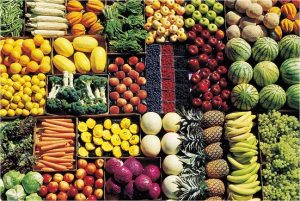Help! Receivers of Good Food Wanted.

http://www.portagewibid.org/wp-content/uploads/2014/11/Farmersmarket.jpg
Our project over the last three months has been to determine the feasibility of redistributing leftover food from farmers markets in the Vancouver area to local organizations working with vulnerable and marginalized populations in Vancouver. Specifically, our focus has been on working with the Dr. Peter Centre (DPC), a community organization that provides services for individuals living with HIV and AIDS. For a complete explanation of the project, please see our proposal. A large part of the DPC’s programing revolves around providing two nutritionally dense, free meals to their clients each day. The original idea was to redirect leftover produce from farmers markets to the DPC so that they could supplement their current meals with local, organic produce or potentially host a third meal daily during the summer season. However after gaining a better understanding of the DPC’s needs, we’ve revised the project as follows.
What
Our project has diverged from the original proposal. After talking extensively with the DPC’s dietician, it is apparent that the Dr. Peter Centre will not be able to use the potential leftover produce due to food safety regulation standards and the uncertain quantity of donations.
Food safety standards are of the utmost importance in preparing food for individuals living with HIV and AIDS since their immune systems are compromised. Foodborne illness poses a much larger risk to these individuals than it does to the average population. Low levels of bacteria on produce, which may be tolerable to individuals with healthy immune systems, cannot be served to immunocompromised individuals due to the enhanced risk. The DPC requires that all food products are kept at food safe temperatures at all times and documented according to the Hazard Analysis Critical Control Point (HACCP), which is an industry standard paper trail that allows food safety concerns to be quickly disseminated through the food chain. HACCP is a food safety control plan that ensures that food is properly processed by addressing critical control points, which are points in food handling and processing at which food safety “controls” can be taken to reduce food safety hazards (Government of Alberta, 2016). An example of a critical control point would be the proper cooking of meat.
The limited volume of donations would also pose a problem for the DPC, as it is important for all of their clients to receive the same meal. As they regularly serve around 100 people at each meal, the quantity of donated food would have to be significant and we cannot guarantee that at this time. Furthermore, many of the vegetables at farmers markets are unique or specialty items that are unfamiliar to the majority of the population. The DPC’s dietician feels that these specialty items would not be well-received by their clients and would deter their clients from eating the meals which would partially defeat the purpose of the meal program.
So What:
Up until this point, the project was proceeding smoothly and unfurling according to our proposal. Learning about the food donation requirements of the Dr. Peter Centre forced us to reconsider the direction we were heading in, as we could no longer proceed as we had initially imagined. This was a significant moment because it made us take a step back and ask important questions that neither we nor our community partner had considered, such as “will other community organizations be able to use the food redistributed to them, or will all organizations have strict safety standards?”
We started the project by talking to farmers to see if they had interest in the idea before consulting the DPC. Had we first gathered information from the DPC, we may have been discouraged by the safety standards we would have to meet. Instead, we were met with great enthusiasm from the farmers, which was extremely motivating early on in the project and it gives us hope that this project can still be made into a reality. Learning that the DPC is not the best-suited community organization for the project is certainly an obstacle to overcome, but since we know we have the support of the farming community, we are motivated to find a different community partner to work with.
The DPC requires stringent food safety and documentation and farmers are unwilling to have to change their practices in order to participate in this project. This creates a challenge, as our two community stakeholders have incompatible (but not irreconcilable) needs and expectations, which exemplifies how important it is to talk to stakeholders at every level of the a project including community partners, organizations, and the people accessing services provided by organizations. Moreover, our experience communicating with the Dr. Peter Centre showed us how different levels of communication with different stakeholders within an organization can affect understanding, the results of a project, and productivity. Our experience also speaks to the importance of listening to community organizations to hear what they really need and to not assume anything.
We initially imagined that the DPC, or any community organization with food programing, would be thrilled to receive locally and organically grown fresh produce for free, however we were entirely wrong. Serving food and making sure it is safe to eat is a complicated but imperative process. In retrospect, we should have talked with the Dr. Peter Centre directly to determine their needs instead of assuming that they’d be receptive to food donations. These themes are reflected in Ernesto Sirroli’s 2012 TED Talk, “Want to help someone? Shut up and listen!”, which we have reflected upon in past blog posts.
His method of community development is to approach a situation without any ideas or preconceived notions. Instead, he becomes friends with the individuals he is working with and listens to their ideas and passions and does his best to facilitate them. He came to this conclusion from working in Africa while attempting to initiate agriculture in a fertile river valley where agriculture was not practiced. Sirolli and his team were able to grow incredible produce in the region, however right before harvest, the hippopotamuses in the area ate the entire harvest. Sirolli and his team suddenly understood why the locals did not practice agriculture and were confused as to why the locals had not told his team that this would happen. The response of the locals was that he had “never asked,” which prompted his idea to always ask what is needed first, instead of coming into a project with preconceived ideas.
The DPC mentioned that they are never at a shortfall for food and would not need a program like the food waste reduction strategy to help their patients access food. This was a significant moment for us because we gained an understanding on how much work and discussion long-term projects take to be effectively implemented.
Now What
“Seek new beginnings in light of failures. What may seem false, may be your greatest teaching.”
- The Buddha
Looking forward, it is imperative that future LFS 350 groups meet with community stakeholders in-person. We have seen how face-to-face connections are more effective in building a project and building relationships within the community. Furthermore, next semester, LFS 350 students will need to find and establish a relationship with a community organization that is able to take surplus and leftover produce from Vancouver’s farmers’ markets.
We found one community partner who may be interested in participating in the program. We found that the project may be more feasible with Rainbow Soup Social, a program run out of the Gordon Neighborhood House in Vancouver’s West End community. This is a weekly event where LGBTQ+ individuals and allies are invited to come together to cook soup for a free meal program held by Gordon Neighborhood House and the Greater Vancouver Food Bank (Gordon Neighbourhood House, 2016). Rainbow Soup Social does not require a HACCP paper trail (industry-standard food safety documentation) for donated produce, but instead requires a one-on-one interview between the food producer and their food program manager to ensure food safety standards are met. This would make our project more feasible by meeting the farmers’ convenience needs, as a single interview is less laborious than filling out HACCP reports.

http://www.in.gov/isdh/files/produce.jpg
“Leadership is not about the next election, it’s about the next generation.”
- Simon Sinek
Group 23 would like to thank you for following our blogs! Our time working on this project may come to a close as the school semesters ends, however our efforts remain. You can continue following this inspiring solution to Vancouver’s food waste crisis by keeping an eye out for future LFS 350 group projects as in January 2017, a new group of students will be furthering our purpose.
Works Cited:
Sirolli, E. (2012). Want to help someone? Shut up and listen! Retrieved from https://www.ted.com/talks/ernesto_sirolli_want_to_help_someone_shut_up_and_listen?language=en
Gordon Neighbourhood House. (2016). Rainbow Soup Social. Retrieved 2 December 2016, from http://gordonhouse.org/programs/rainbow-soup-social/
Government of Alberta, F. (2016). HACCP: Principle 2 – Determine Critical Control Points (CCPs). Www1.agric.gov.ab.ca. Retrieved 2 December 2016, from http://www1.agric.gov.ab.ca/$department/deptdocs.nsf/all/afs4341